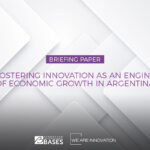Each January, the world’s most influential minds gather in Davos to chart the course of the future. The 2025 World Economic Forum promises to be no different. This year, however, the stakes are unmistakably high. As AI keeps reshaping industries and global systems, Davos 2025 will serve as a core discussion platform for policies that will define the “intelligent age.”
More Than a Buzzword
The intelligent age is not a futuristic fantasy. It’s here. AI systems analyze financial markets in real time, predictive algorithms transform healthcare diagnostics, and autonomous vehicles hint at a driverless tomorrow. But progress is neither linear nor universally equitable.
Technology’s benefits often disproportionately favor the Global North. Meanwhile, the Global South struggles with digital infrastructure gaps. Inequity isn’t the only challenge — issues of privacy, ethical governance, and cybersecurity loom large. At Davos 2025, these gaps and tensions will take center stage.
The Big AI debate
The agenda for this year’s Forum is shaped by policy discussions that have the potential to redefine how nations and industries innovate, regulate, and share advancements in technology, particularly AI use.
Undoubtedly, AI brings new global opportunities. But as we know, with great opportunities, there come great responsibilities and ethical dilemmas. At Davos 2025, policymakers will discuss unified frameworks for transparency and accountability in search of the balance between innovation, safeguards, and AI’s misuse.
One of the topics to consider is the ownership of intellectual property created by AI. Should creators retain exclusive rights to AI-generated works, or should there be shared ownership models for tools and datasets? Such questions are not just theoretical; they impact media, healthcare, and software development.
Later, what is the integration of ethical AI practices into legislation? Should it include requiring audits for AI systems? If so, what global standards should be set for AI deployment and how to address cross-border implications of AI misuse? Nations may also grapple with the role of “AI watchdogs.”
Finally, there’s the human factor. With AI automating tasks and reshaping job markets, policymakers have to consider education and reskilling initiatives. How do we prepare workers for an AI-driven economy while ensuring the dignity of labor?
Global Data Sovereignty
Davos 2025 puts global data sovereignty under the microscope. In an age where data is both a weapon and a resource, nations are racing to localize it, framing their efforts as vital for national security and economic independence. Yet, these policies often collide with the realities of global corporations that thrive on seamless data flows to innovate and scale.
This year, expect proposals aimed at harmonizing privacy laws. Leaders may work on frameworks modeled after the GDPR to ensure user rights are safeguarded without stifling progress. But the stakes go beyond regulation. Who owns data? How can it be shared equitably to fuel innovation without reinforcing digital colonialism? Davos will seek to answer these questions, setting the stage for a more balanced approach to data governance — one that prioritizes both sovereignty and shared progress.
Cybersecurity: From Threats to Standards
Cyberattacks on critical infrastructure are no longer theoretical. They are real, frequent, and devastating. The ripple effects of these attacks — on energy grids, hospitals, and financial systems — demand immediate action. At Davos, leaders will confront the need for global cybersecurity standards, particularly for such critical sectors as energy and public health.
Central to the debate is the idea of mandatory standards and information-sharing protocols. Can nations agree to transparency in identifying and neutralizing threats? The trickier issue lies in state-sponsored cyber operations. It gives the space to discuss ethical norms for these shadowy activities, but the long-term goal can be global agreements, such as a digital Geneva Convention. Davos 2025 will bring to the table possible solutions for the increasing digital vulnerability.
Sustainability in Tech: Greening the Future
The tech industry’s carbon footprint can no longer be ignored. Davos 2025 will amplify green computing initiatives, focusing on reducing environmental impact without compromising progress. Quantum technologies are emerging as a low-energy alternative, though scaling them remains a hurdle. Attention will also turn to hardware. The Forum will call for coordinated efforts between governments and the private sector to create standards for eco-conscious production. The message is clear: the tech sector must innovate in harmony with the planet.
Beyond National Borders: Building Transnational Coalitions
Global challenges demand global solutions. Davos 2025 will champion transnational coalitions, underscoring the power of shared innovation to solve humanity’s most pressing problems. Initiatives like the “AI for All” pledge, which democratizes AI advancements, will likely dominate the agenda. These efforts are crucial for addressing global issues like climate modeling and pandemic response.
But the call for inclusivity will be just as loud. Equity in tech means giving historically excluded groups — from rural communities to women in STEM — a seat at the table. Expect leaders to discuss programs that provide access to education, funding, and leadership roles. Inclusive innovation isn’t just ethical; it’s essential to unlock global potential.
Cautious Optimism
None of these challenges can be solved in isolation. Davos 2025 is expected to emphasize the need for transnational coalitions on innovation. Policymakers, CEOs, and civil society must align on guidelines when exploring technologies. Initiatives like the “AI for All” pledge could commit nations to share breakthroughs that benefit humanity, from climate modeling to pandemic prevention. Technology should not only serve the powerful. Equity-focused discussions will call for inclusive innovation—ensuring that rural communities, women in tech, and historically excluded populations have seats at the table.
Davos 2025 will not resolve every question about the intelligent age. But it will signal where the world is heading. Setting the tone for tech and innovation policies can foster a future where collaboration trumps competition and intelligence — both artificial and human — works in harmony. For now, all eyes turn to the Swiss Alps, where snow-covered peaks will bear witness to humanity’s attempts to shape an intelligent and inclusive tomorrow.
* Tetiana Rak is the Chief Operations Officer (COO) at We Are Innovation. A journalist and freedom activist with 8 years of experience, Tania has worked with renowned media outlets including CNN, TechCrunch, Fox News, HackerNoon, the BBC, and Radio Free Europe, among others. Her unwavering dedication to championing the ideas of technological advancements and global digital transformations has earned her a distinguished reputation in the field. Through her work, Tania promotes the ideas of liberty, and individual rights as a cornerstone of any rights-respecting society. Strengthened by the experience of war in Ukraine, Tania’s beliefs also stand for promoting technological advancements as the transformative tool to advance liberty, giving people the opportunity to speak, act, and pursue happiness without unnecessary external restrictions.
Source: We Are Innovation











